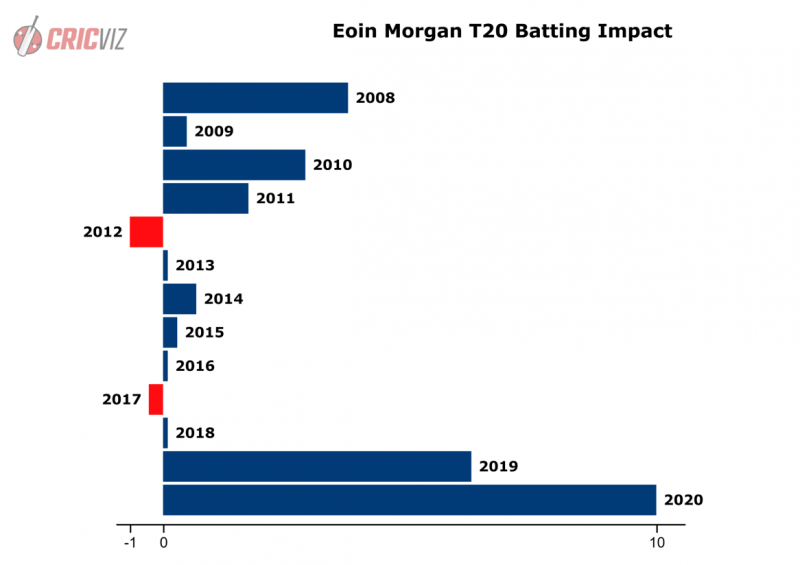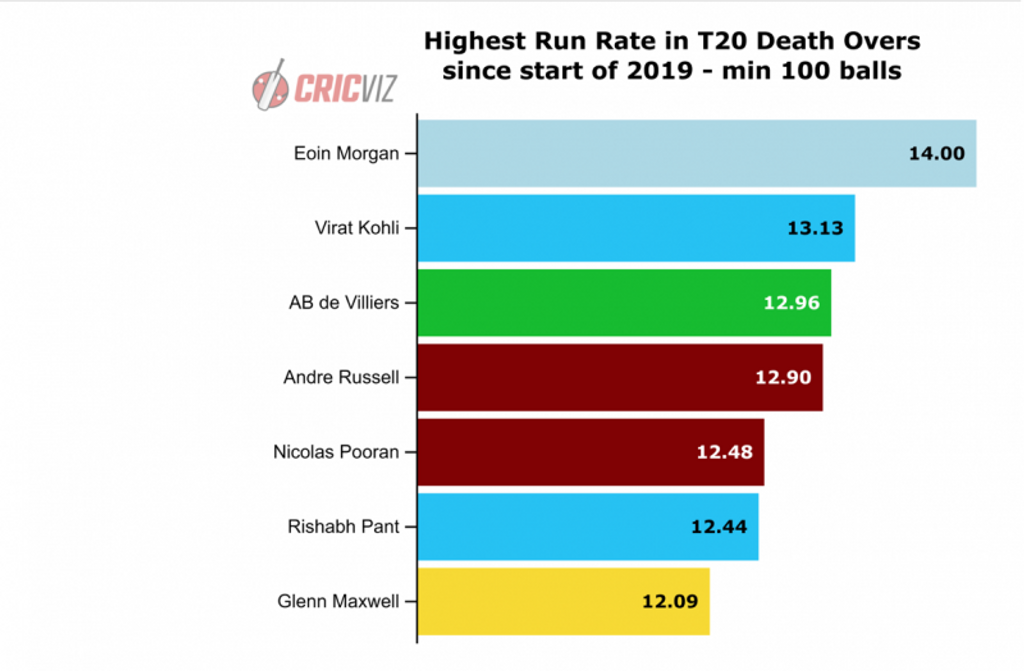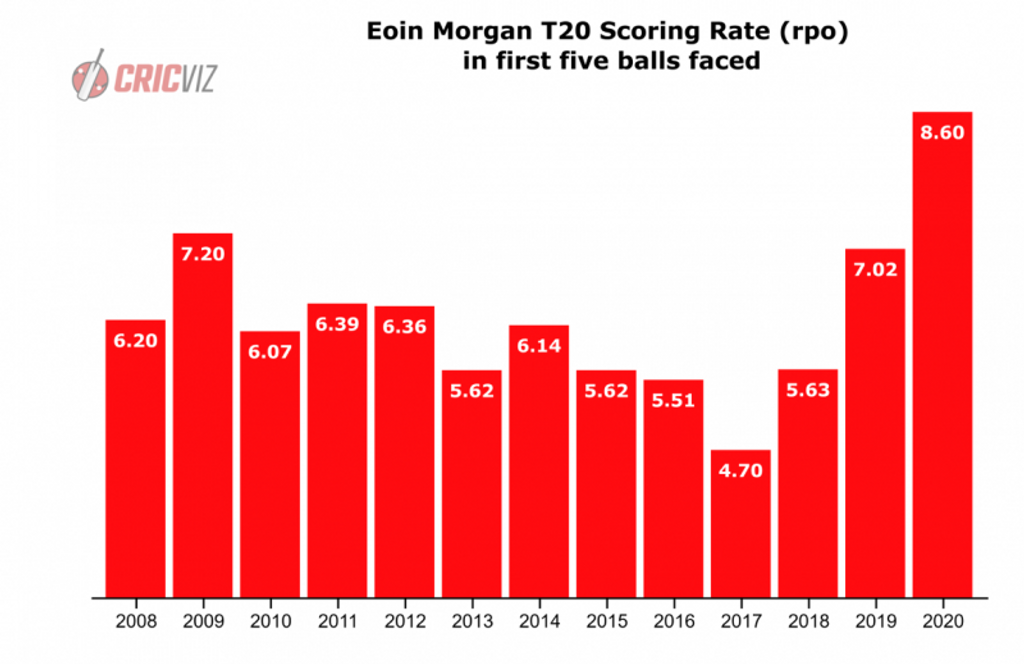
Eoin Morgan is in the form of his life. CricViz analyst Ben Jones argues that one potential solution to England’s finishing dilemma could be for their in-form captain to step up by moving down the order.
One long-running selection dilemma for England has been where to place Jos Buttler in the order. However, after much gnashing of teeth and airing of opinions, the deal seems settled. After his successful IPL stint with Rajasthan Royals in 2018, England pushed Buttler up to open, the position where he had thrived in India, and it’s been successful. In the eight innings he’s played since that promotion, Buttler has three half-centuries, a handful of short but rapid efforts, and only one single digit score. Returning to the T20 side this week having been unavailable due to red-ball commitments, Buttler has been confirmed as England’s opener – alongside Jonny Bairstow – for the first T20I against Australia.
However, the consequence of Buttler’s successful promotion is that England no longer have a specialist finisher. Moeen Ali has partially performed the finisher role, registering several failures in amongst two fire-cracker knocks against South Africa and Pakistan, but hasn’t completely convinced. Bairstow has been tried there, but he’s now too valuable at the top of the order to play elsewhere. Ben Stokes is a magnificent ball-striker, but finds it tough to go hard from the first ball, while Jason Roy is not strong enough against spin to move nearer to the middle overs.
Batsmen who have performed well in the Blast – Sam Curran, Lewis Gregory, and Sam Billings – have found it tough to make a significant impact when given opportunities in England colours. Alternatives who have performed that finishing role for domestic sides around the world, Liam Livingstone being the notable example, have not been given an opportunity to prove their worth in England colours – Livingstone played the last of his two T20Is more than three years ago.
All of which is a long-winded way of saying that, 12 months out from a World Cup, England don’t know who their finisher is going to be. It’s not a fatal flaw, and it’s a problem with many solutions, but one potential solution would be their in-form captain to step up – and move down.
As a batsman, Eoin Morgan is in the form of his life. Having always been an innovative, explosive player, England’s white-ball captain has hit new heights in the last year or so; since the start of 2019, he’s played 24 T20 innings, racking up an astonishing 835 runs, at an average of 43.94 and a scoring rate of 10.32 runs per over (rpo).

There has been a clear improvement in his ability to clear the ropes. In T20Is, he’s been hitting a six every eight deliveries; the only man in the world with a better record in that time is Andre Russell. Elite company, when it comes to range-hitting, and as a result Morgan’s recent record at the death is astonishing. Since the start of last year, in overs 16-20, he has faced 102 deliveries and smashed 238 runs off them, a staggering scoring rate of 14rpo.

Morgan’s also been starting his innings at breakneck speed. In the last 18 months, his scoring rate in the first five balls faced has risen significantly from what he’s been doing previously. One disadvantage of moving other destructive batsman in England’s order into the finishing role – Stokes in particular – is the idea that they are burdened by needing to ‘get in’, and find it tough to hit out from ball one. Morgan has no such burden.

And so, the profile of a top class finisher takes shape: a fast scorer, particularly at the death, capable of hitting sixes with relative ease, and able to score quickly even in those first few deliveries at the crease. England can continue to search high and low for a finisher, but they have one right under their nose.

There are broader benefits as well. The consequence of moving Morgan down (rather than trying to find an external solution, introducing and bedding in a new player) is that it allows England to pick more of what they have a lot of – top order batsmen. While Alex Hales still appears to be persona non-grata in the England set-up, they still have the talents of Dawid Malan and Tom Banton (and to a lesser extent Livingstone, James Vince and Phil Salt) sat on the bench.
There’s a nice extra layer to the move as well. Other batsmen, if moved down to a finisher role, would demand (either implicitly or explicitly) to subsequently move up if they made a success of the role. By contrast, Morgan likely wouldn’t want to bat any higher than he already does; his record against the bouncer is poor, and facing a new ball attack would not get the best out of him.
The case is there, one of a number of solutions to England’s quandary. Ultimately, Morgan may back his abilities as a captain, rather than as a finisher, and keep trying to find and integrate a player from outside the team to assume that finishing role. This makes complete sense, and when you have the track record of success that Morgan does, you earn the right to do things your way. However, as the tournament grows nearer, the pressure climbing and the consequences of failure ever clearer, the temptation to take that role and make it his own, will only increase. If he chooses to take it on – in his current form – you’d back him to smash it out of the park.








